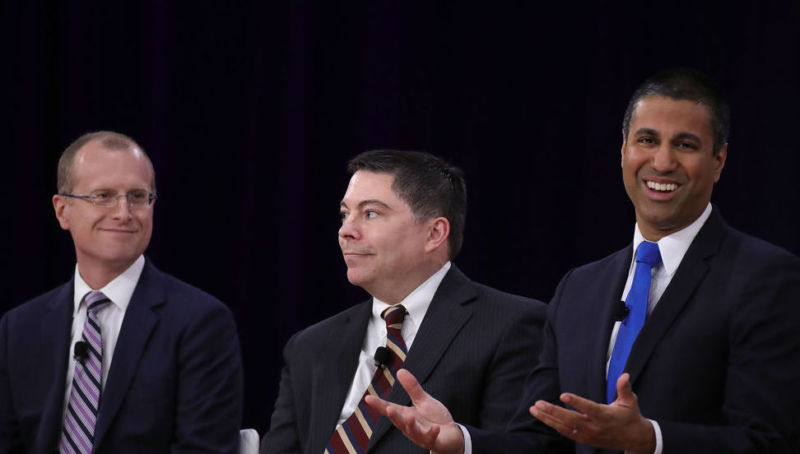
Two Republican members of the Federal Communications Commission face accusations that they violated government ethics rules during appearances at the Conservative Political Action Conference (CPAC).
FCC Chairman Ajit Pai was given the National Rifle Association’s Charlton Heston Courage Under Fire Award at CPAC Friday. Accepting the award is almost certainly a violation of government ethics rules, according to Walter Shaub, who was director of the US Office of Government Ethics from 2013 to 2017. Pai has not publicly responded to the accusation.
Also on Friday, FCC Commissioner Michael O’Rielly called for the re-election of President Donald Trump during his appearance at CPAC. Advocacy group American Oversight called for an investigation of O’Rielly, saying that he violated a rule against “engaging in partisan political activity while on duty.”
During a panel discussion, O’Rielly was asked how conservatives can prevent the “regulatory ping-pong” that happens at the FCC when the balance of power shifts between Democrats and Republicans.
“I think what we can do is make sure as conservatives that we elect good people to both the House, the Senate, and make sure that President Trump gets re-elected,” O’Rielly responded.
A spokesperson for O’Rielly denied that he was “engaging in advocacy.”
“Commissioner O’Rielly was asked a question on how to prevent the agency from ping-ponging back and forth. He tried to respond in a factual way without engaging in advocacy,” an O’Rielly spokesperson told Ars.
Pai’s NRA award
Shaub made his accusations about Pai’s NRA award in a series of tweets. Government standards of ethical conduct prohibit the acceptance of gifts and awards in many situations, he noted.
“Anyone care to explain to me why the FCC thinks that the ethics rules allow Ajit Pai to accept the gift of an expensive handmade gun from the NRA, an entity whose interests he can affect (and has affected) by the performance of his official duties? Am I missing something?” Shaub asked.
Anyone care to explain to me why the FCC thinks that the ethics rules allow Ajit Pai to accept the gift of an expensive handmade gun from the NRA, an entity whose interests he can affect (and has affected) by the performance of his official duties? Am I missing something? https://t.co/S6ocyWIV7H
— Walter Shaub (@waltshaub) February 24, 2018
Exceptions to those standards apply only “when you cannot affect the interest of the giver,” Shaub continued. But the NRA apparently supports Pai’s decision to eliminate net neutrality rules, “so the NRA seems to think he can affect its interests,” Shaub wrote.
Even then, the exception applies only for “a bona fide public service award,” which doesn’t seem to apply to the NRA award, he wrote.
“And even beyond the Standards of Conduct, the ethics pledge that Pai signed bars gifts from lobbyists,” Shaub wrote. “(This is true whether the White House thinks Pai is covered by the old Obama pledge or the weaker Trump pledge.) And the NRA is a registered lobbying organization!”
We contacted Pai’s office about Shaub’s accusations today and will update this story if we get a response.
Pai apparently did not know about the award in advance, as he seemed to be taken by surprise when it was announced on stage. The actual award was described as a Kentucky handmade long gun, but Pai did not receive it on Friday.
“We cannot bring it on stage,” NRA board member Carolyn Meadows said during the presentation, noting that the gun would be housed in the NRA’s museum along with a plaque honoring Pai. “When you can receive it, we’ll give it to you,” she said.
The FCC’s vote to eliminate net neutrality rules appears to be the main reason Pai won the award.
“Ajit Pai, as you probably already know, saved the Internet,” American Conservative Union (ACU) Executive Director Dan Schneider told the audience during the award presentation.
When a gift’s value exceeds $200, the FCC has to make a written determination of whether the gift is allowed. “I’m sure this gift is worth more than $200, so where is the FCC’s written analysis?” Shaub asked. “You know, the one the regulation requires FCC to issue.”
O’Rielly and the Hatch Act
American Oversight, which was launched last year and is led by former State Department lawyer Austin Evers, says that O’Rielly’s pro-Trump comment violated the Hatch Act.
“The Hatch Act explicitly prohibits federal employees from engaging in partisan political activity while on duty,” American Oversight wrote. “O’Rielly was appearing at CPAC in his official capacity as a commissioner of the FCC—the government body which oversees regulation of the news media and the Internet—and his call for Trump’s reelection violated direct guidance issued by the Office of Special Counsel (OSC) regarding federal employees and President Trump.”
That OSC guidance notes that President Trump has “filed paperwork with the Federal Election Commission establishing that he is a candidate in the 2020 Presidential election.” This means federal employees are prohibited “from expressly advocating for or against his reelection in 2020” while on duty or in the workplace, the guidance says.
“Commissioner O’Rielly’s naked partisanship fundamentally undermines the independence that is supposed to be at the heart of the FCC’s work,” Evers said.
O’Rielly hasn’t received a complaint, his spokesperson told Ars. But American Oversight sent a letter to the US Office of Special Counsel, asking for an investigation and punishment.
“Commissioner O’Rielly clearly violated the Hatch Act,” Evers wrote in the letter. “We hope you will fully investigate this conduct—although we do not believe it to present a difficult question. We further urge you to impose or recommend a sanction that takes account of this administration’s repeated transgressions of the Hatch Act, as well as Commissioner O’Rielly’s clear violation of black-and-white guidance from OSC.”
https://arstechnica.com/?p=1265941

